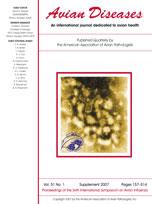The production and supply of reference reagents for the diagnosis of avian influenza (AI) is one of the duties of the World Organization for Animal Health reference laboratories. The lyophilized reagents are routinely shipped on dry ice to both national and international clients. In order to determine the effect of different short-term storage temperatures on the activity of AI reference reagents, vials containing lyophilized avian influenza A antigens and antisera preparations were maintained at 4 C, 22 C, and 37 C over a 21-day period. At days 0, 3, 7, 14, and 21 the reagents were titrated using the hemagglutination test, the hemagglutination inhibition test, or the agar gel immunodiffusion test (AGID). All of the AI antigens that were kept at 4 C and 22 C retained hemagglutinating activity for at least 21 days, but when they were stored at 37 C several lost their hemagglutinating activity. All of the reference antisera tested were still able to inhibit hemagglutination after 21 days, and the antigen used in AGID also gave clear results after 21 days even after incubation at 37 C. Our results therefore indicate that lyophilized avian influenza antigens maintain their hemagglutinating activity at temperatures between 4 C and 22 C for at least 21 days, and both antisera and antigens prepared for AGID remain stable for 21 days between 4 C and 37 C. This information will allow for alternative shipping temperatures than those presently recommended, in addition to the short-term storage of these reagents at nonrefrigerated temperatures.
How to translate text using browser tools
1 March 2007
Effect of Different Temperatures on the Stability of Avian Influenza Reference Reagents
William G. Dundon,
Laura Boscarato,
Elisa Mazzacan,
Silvia Maniero,
Marica Toson,
Ilaria Capua
ACCESS THE FULL ARTICLE

Avian Diseases
Vol. 51 • No. s1
March 2007
Vol. 51 • No. s1
March 2007
avian influenza
reagents
temperature stability




